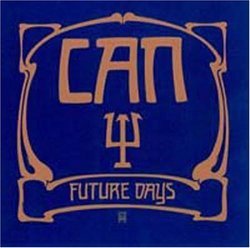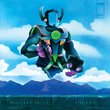| All Artists: Can Title: Future Days Members Wishing: 1 Total Copies: 0 Label: Mute U.S. Original Release Date: 1/1/2005 Re-Release Date: 6/28/2005 Genres: Dance & Electronic, Alternative Rock, International Music, Special Interest, New Age, Pop, Rock Styles: Electronica, Europe, Continental Europe, Experimental Music, Progressive, Progressive Rock Number of Discs: 1 SwapaCD Credits: 1 UPC: 724596928820 |
Search - Can :: Future Days
 | Can Future Days Genres: Dance & Electronic, Alternative Rock, International Music, Special Interest, New Age, Pop, Rock
|
Larger Image |
CD DetailsSimilar CDs
|
CD ReviewsOne of CAN's three masterpieces Juan Mobili | Valley Cottage, NY USA | 06/28/2006 (5 out of 5 stars) "Beginning in the late Sixties and reaching in its greatest moments during the first half of the following decade, Germany produced some of the most daring and singular music Rock and Electronica saw in those days. Groups like Tangerine Dream, Kraftwerk and Amon Duul, each in its own distinct manner did much more than imitating the great bands in the UK and the United States. Speaking of originality and adventurousness, CAN was even more important than the groups already mentioned, and possibly the best German band of all times. Now, to choose a single album by CAN is literally impossible, yet "Future Days" should make anyone's short list. Along with its two predecessors, "Ege Bamyasi" and "Tago Mago," this album presents a band at the top of its ever-changing form. By then, 1973, CAN had been together long enough to have an almost psychic musical connection with each other, and the continuous evolution of their sound reached its peak in Future Days. Whether it is the sinuous bass lines Holger Czukay offers or the incomparable groove of drummer Jaki Leibezeit in the opener "Future Days" or Michael Karoli's guitar in "Spray" or the funky "Moonshake," this album is an amazing show of minimalism, the adventurous stripped to its essence, yet full of nuances and moods, further enhanced by Damo Suzuki's shamanic singing and keyboardist Irmin Schmidt's proto-Ambient cadences. This is even more poignant in the final and longest song "Bel Air" which sums up everything that CAN gained its reputation on, and more than enough reason to deserve a more prominent place among the bands--anywhere!--that shaped contemporary Rock and Electronica." CAN's most underrated album--a lost masterpiece Matthew Sutton | washington dc | 09/03/2006 (5 out of 5 stars) "While Tago Mago and Ege Bamyasi often get the critical accolades they deserve, the superb Future Days is still rather obscure. I would go so far as to say that Future Days rivals the earlier two albums quality-wise, but its brevity (only 4 tracks) makes the former two much better buys (for the Can initiate). If you already own Tago Mago and Ege Bamyasi this should be the next acquisition--it will not disappoint. This compositions presented here, especially "Moonshake" and the 20 minute "Bel Air", are completely self-assured and have an atmospheric, almost impressionistic quality. This was probably Can at its peak: Schmidt, Czukay, and Karoli, with the incredible Damo Suzuki. Can fans should have this, as should any devotees of Krautrock on the order of Tangerine Dream's Phaedra. Future Days was Damo Suzuki's last recorded album as the vocalist for Can, and while there are great tracks which both precede and supersede his tenure, no one would doubt that it was with Suzuki, that Can produced its finest work, including the historic albums mentioned above. This is a terrific album. Also a great cover; I can't help but think they had in mind Peter Behren's Art Nouveau graphic design for AEG." Another flawed masterwork IRate | 10/12/2008 (4 out of 5 stars) "Rarely have better stream-of-consciousness psychedelic recordings stood the test of time like Can's intensely organic approach. Though they specialized in a sort of cosmic noodling, fusing together scarcely grouped elements with unconscious elegance, almost all apparent flux comes layered with knowing musical intuitions, breaking away from many counterparts who tried, and failed, harder."
|

 Track Listings (4) - Disc #1
Track Listings (4) - Disc #1


